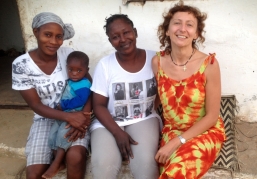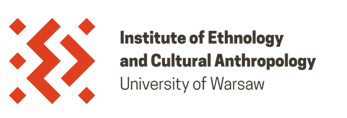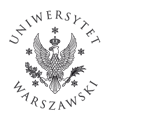Dr Magdalena Brzezińska

Area of interest
West Africa (Guinea-Bissau 2002, 2010-11, the Gambia 2016, 2017) and briefly in Poland (2010-11), Nepal (2011) and Botswana (2003): transnational migration, youth, gender, postcolonialism, globalisation, development, religion and witchcraft, dance
Biography
Education:
- International Baccalaureate School No. 0704 (Gdynia, Poland). Diploma received: International Baccalaureate Bilingual Diploma (results: 41 per 45 points), 1998.
- University of Birmingham (UK), Department of Dance and Theatre Arts. Title received: Bachelor of Arts in Dance and Theatre Arts, 2002.
- University of Warsaw (Poland), Department of Oriental Studies. Title received: Master in Culture Studies, specialty: Inter-Cultural Relations, 2008.
- University of Warsaw, Department of Oriental Studies - doctoral student on full-time course, 2008-2013.
- Phd in Ethnology, Institute of Ethnology and Cultural Anthropology, Faculty of History, The University of Warsaw, 25.03.2015.
Selected publications
Books:
W cieniu europejskiej twierdzy. Obraz Zachodu wśród Afrykanów w Gwinei Bissau (In the Shadow of the European Fortress. The image of the West among Africans in Guinea-Bissau), Wydawnictwa Uniwersytetu Warszawskiego, Warszawa 2017 [pp. 380].
Kontrakt z duchami”. Czary i religia w Gwinei Bissau (Contract with Spirits. Witchcraft and Religion in Guinea-Bissau), Sopockie Wydawnictwo Naukowe, Sopot 2014 [pp. 216, review by Prof. Ewa Siwierska].
Articles:
Nowoczesność dzięki kontraktom z duchami. Postrzeganie Europejczyków, Zachodu i pomocy rozwojowej w Gwinei Bissau (Modernity due to Contracts With Spirits. The Perception of Europeans, the West and Development Aid in Guinea-Bissau) [w:] Arkadiusz Żukowski (ed.) 'Forum Politologiczne. Tradycja i nowoczesność w Afryce. Społeczeństwo – polityka – gospodarka – kultura', vol. 19, Instytut Nauk Politycznych, Uniwersytet Warmińsko-Mazurski w Olsztynie, Olsztyn 2017, p. 119–142.
Do Europy przez plażę. Relacje z białymi turystkami jako strategia migracyjna Afrykanów (Gambia, Senegal, Gwinea Bissau) (To Europe Via the Beach. Relations With White Tourists As a Migration Strategy of Africans (the Gambia, Senegal, Guinea-Bissau)), [in:] Waldemar Cisło, Jarosław Różański, Maciej Ząbek (eds.), 'Bilad as-Sudan. Dziedzictwo przeszłości', Wydawnictwo Uniwersytetu Kardynała Stefana Wyszyńskiego, Warszawa 2015, p. 257–285.
Brzezińska, Magdalena, 2013, "Krokodyle przemienione" i kontrakty z duchami: czarownicy w kulturach Gwinei Bissau (Contracts with Spirits and Crocodiles Magically Transformed: Witchcraft in Guinea-Bissau), 'PRZEGLĄD ORIENTALISTYCZNY, 1-2, pp. 84-101 [ERIH list].
- Brzezińska, Magdalena, 2012, Ja i chłopak mojej dziewczyny – analiza wielopartnerskich związków kobiet i mężczyzn w Gwinei Bissau (Me and my girlfriend’s boyfriend – an analysis of polygamous relationships of men and women in Guinea-Bissau), A. Chybicka, N. Kosakowska-Berezecka, P. Pawlicka (eds), 'Podróże przez kobiecość i męskość', Kraków, Oficyna Wydawnicza Impuls, pp. 225-250.
- Brzezińska, Magdalena, 2009, Sacrum w kulturach afrykańskich. Drzewo i las (The Sacred in African Cultures. The Tree and the Forest), AFRYKA. POLSKIE TOWARZYSTWO AFRYKANISTYCZNE, 29-30, pp. 86-106.
- Wrońska, Olga (author), 2010, M. Brzezińska (translation into English), Do literary studies need psychoanalysis?, 'Beyond philology. An International Journal of Linguistics, Literary Studies and English Language Teaching', No. 7, Wydawnictwo Uniwersytetu Gdańskiego, pp. 239-259.
Research projects
Currently realised project:
Migrations of Africans to Europe - reasons, expectations and strategies based on research in the Gambia and Guinea-Bissau
The project (2016-2018) is financed by a grant from the National Science Centre, Poland (SONATA).
Migrations of Africans to Europe are a vital current issue. Thousands of Africans each year are trying to reach European shores and penetrate its borders. The media inform regularly of yet another tragedy on the sea. Is it only the most dramatic of circumstances that push people to the decision about such a risky journey? My research so far suggests that socio-cultural phenomena play an equally important role as the political and economic aspects of the situation. The aim of this project is to investigate, in the Gambia and in Guinea-Bissau, the phenomenon of idealisation of Europe as a vital factor in migrations, including cultural mechanisms contributing to its persistence, secondly, to examine elements contradicting that idealization, i.e. attitudes towards European cultural norm and values, thirdly, migration strategies of Africans and fourthly the long-term sources of the idealization of Europe and individual motives for migration.
Europe is the object of dreams and aspirations for many Africans today. Gambians as well as Guineans talk about Europe very often and the desire to migrate there is a commonly voiced aspiration, especially among young men in the urbanities. For many, Europe seems the ideal destination of their imagined life path as its image is strongly idealised. How do they actually imagine their life in the West – their career possibilities, the degree of wealth that would become their share? Preliminary research suggests that this image is blurred and incomplete and expectations are idealistic. The degree of idealization of Europe is especially striking in religious and magical beliefs of the region, especially in contemporary forms of beliefs in witchcraft. The power of the image of Europe in Guinean discourses is such that I propose to describe it as living in European shadow.
While the West in general is strongly idealized, the attitude of Guineans towards European cultural norm and values is more ambivalent. Some of them are approved of, others induce criticism. Men dreaming of emigration postulated for example retaining their rights to polygamy, proposing polygamy in a kind of a “transcontinental” version. What arguments do Africans use to approve of or reject certain cultural elements of the West? In what ways are European norms incorporated into their own customs and values?
What are the migration strategies taken up by Africans of this region? It is often emphasized nowadays that globalization has brought about an unprecedented mobility of people and the geographical space has dramatically shrunken. In what way is the global space experienced by people living in an average African country however? To them, Europe seems a barricaded place which Africans find extremely difficult to get to. The way they talk about Europe makes one think of a “fortress”. The most frequent strategy is the help of emigrants in the family. Another road to Europe leads “via the beach” – contacts (including sexual ones) with Western tourists spending their holiday in seaside resorts of the Gambia and Senegal. Some Africans of this region take up illegal migration “via the sea route” – a dangerous journey across the ocean on board of wooden boats setting off from Senegal, which ends tragically for many.
What gives Europe such a prominent place in the collective imagination of contemporary Africans? I want to demonstrate that the dominant European presence in Guinean discourses needs to be explained not only in reference to global economic differences but in the context of specific conditions of globalisation of the present day, colonial legacy and the impact of the Western ideology of development and modernity.
Research project methodology
Fieldwork in the Gambia and Guinea-Bissau, vital for the realisation of the project will enable gathering the necessary ethnographic material. It will be based on anthropological methods of fieldwork, which includes above all the method of interview and and participant observation: structured, semi-structured and free-form interviews as well as in-depth biographical interviews will be carried out and recorded. The so called djumbai-approach will also employed, a method appropriate to African realities and cultural norms, and consisting of the observation of informal group conversations with partial participation of the researcher. The preliminary fieldwork that I have already conducted in Guinea-Bissau show the presence of the attitudes mentioned above in the discourses of Guinean people.
Expected impact of the research project on the development of science, civilization and society
Migrations of Africans to Europe are a phenomenon of the utmost importance in today's relations between Europe and Africa. They have serious consequences for the host societies and a dramatic dimension for its participants. They require an in-depth understanding of the roots of the problem.
I propose to analyse an area which has not been thoroughly explored in social sciences so far: the phenomenon of idealisation of Europe in discourses of Africans as the driving force in migrations. A large part of anthropological literature of the recent years underlines positive outcomes of global cultural processes for the identity, aspirations and life trajectories of people around the world. It is common in social sciences today to question treating global connections in terms of “centre” and “periphery”. Researchers emphasize that the horizons of the social, collective imagination have widened; this process has been described as “freeing the imagination”. The West, however, exerts an intensive cultural influence over various places of the world. In spite of the optimistic literature produced about global cultural processes lately, we have to consider these influences in terms of cultural domination; a symbolical power that the image of the West has over peoples' imagination in various places of our planet.
Earlier work on research projects:
- Research fieldwork on religious and magical beliefs in Guinea-Bissau, 3 months, 2002.
- Research on aspests of intercultural contact among immigrants in Poland, a group research research project headed by Prof. Ewa Nowicka-Rusek, Warszawa, Sopot, 2010.
- Research fieldwork on the image of Europe and the impact of Western discourses in Guinea-Bissau, 3 months, 2010-2011.
- Research fieldwork on the image of Europe in the Gambia, 1 week, 2010, 2011.
- Research fieldwork on the impact of Western tourism on village communities in Nepalese Himalayas, a group research project headed by Prof. Ewa Nowicka-Rusek, head of the Social Anthropology Unit at the Institute of Sociology at the University of Warsaw, 1 month, 2011.
Conferences and visiting lectures
- Presentation at the conference 'Naukowe Spotkania z Afryką', Olsztyn, 18-19 May 2015: „Modernity due to contracts with spirits. The perception of the Whites, the West and development aid in Guinea-Bissau”.
- Presentation at the 3rd Congress Of Polish Africanists, Szczecin, 10-12 May 2012: “Me and my girlfriend’s boyfriend – an analysis of polygamous relationships of men and women in Guinea-Bissau”.
- Presentation at the Academic Conference of the Social Anthropology Section of the Polish Sociology Society, Cieszyn, 29 Sept.-1 Oct. 2011: “Boundaries Between Everyday Life of Nepalese Natives and Tourism of Western Strangers”.
Awards and Scholarships
- Nomination to the Minister's Award for an excellent PhD thesis, W cieniu europejskiej twierdzy. Obrazy Zachodu w dyskursach mieszkańców Gwinei Bissau („In the Shadow of the European Fortress. Images of the West in Discourses of the People in Guinea-Bissau”), proposed by the Department Council of the Dept. of History UoW, May 2015.
- Diploma of Merit from Minister of National Education, dr hab. Mirosław Handke "for outstanding results" at the International Baccalaureate Organization exams, Poland, 19 Sept 1998.
Member of scientific organizations
Afryka. Polish Africanist Society
- Work in development aid (relevant to research goals):
- Training in HIV/AIDS prevention in Africa, Humana People to People; Denmark, 2002 (4 months).
- Work in HIV/AIDS prevention, ADPP (Ajuda de Desenvolvimento de Povo para Povo); Bissau and Bissorã, Guinea-Bissau, 2002 (3 months).
- Work in HIV/AIDS prevention, TCM Program (Total Community Mobilization), Humana People to People; Tutume and Kasane, Botswana, 2002-3 (6 months).
- Work at NGO's Fair in Milan and in Denmark, Humana People to People, 2003 (1 month).



